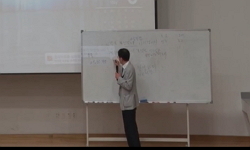Wu-Am(尤庵) Song Si-ryeol (宋時烈) was a remarkable individual in late Joseon Dynasty as a politician, Confucian scholar, and academic who exerted significant influence. This study focuses on Wu-Am’s legal philosophy. Wu-Am developed a politica...
http://chineseinput.net/에서 pinyin(병음)방식으로 중국어를 변환할 수 있습니다.
변환된 중국어를 복사하여 사용하시면 됩니다.
- 中文 을 입력하시려면 zhongwen을 입력하시고 space를누르시면됩니다.
- 北京 을 입력하시려면 beijing을 입력하시고 space를 누르시면 됩니다.
https://www.riss.kr/link?id=A108969390
-
저자
손경찬 (충북대학교 사회교육과)
- 발행기관
- 학술지명
- 권호사항
-
발행연도
2024
-
작성언어
Korean
-
주제어
Wu-am(尤庵) Song Si-yeol(宋時烈) ; natural law ; li(理) ; qi(氣) ; transformation ; 우암 송시열 ; 자연법사상 ; 리(理) ; 기(氣) ; 변통(變通)
-
등재정보
KCI등재
-
자료형태
학술저널
-
수록면
393-430(38쪽)
- DOI식별코드
- 제공처
-
0
상세조회 -
0
다운로드
부가정보
다국어 초록 (Multilingual Abstract)
Wu-Am developed a political ideology based on the principles of Rectification of Names(正名論) and Righteousness(義理論), emphasizing the importance of ‘Integrity(名節)’ and ‘Propriety(禮義)’. He emphasized the significance of righteousness(義) and principle(理) ‘beyond’ the actual laws and regulations, arguing that qi(氣), representing the realm of facts, and li(理), representing the realm norms, are inherently interconnected. Therefore, to Wu-Am, ‘law’ served as a crucial tool and means to uphold and embody righteousness(義) and principle(理). In this aspect, Wu-Am's legal philosophy shares similarities with Western ‘natural law theory’, which recognizes law is solely more than the sum total of existing laws and regulations.
As a practical politician, Wu-Am made numerous efforts to revise the legal system. He sought to improve the status system of slaves, advocated for laws to compel the yangban (noble class) to pay taxes, and supported the Great Unity Law(大同法), which aimed to reduce taxes to 10%. Furthermore, Wu-Am argued for the application of Zhu family ritual(朱子家禮) in cases lacking statutory provisions during the Ye-Song(禮訟) debate, indicating another resemblance to natural legalism. As a pragmatic politician, Wu-Am upheld principles of legitimacy and righteousness but also advocated for ‘flexibility(變通)’ in finding and implementing institutional improvements that were appropriate for the ‘right times(時宜)’.
Wu-Am(尤庵) Song Si-ryeol (宋時烈) was a remarkable individual in late Joseon Dynasty as a politician, Confucian scholar, and academic who exerted significant influence. This study focuses on Wu-Am’s legal philosophy.
Wu-Am developed a political ideology based on the principles of Rectification of Names(正名論) and Righteousness(義理論), emphasizing the importance of ‘Integrity(名節)’ and ‘Propriety(禮義)’. He emphasized the significance of righteousness(義) and principle(理) ‘beyond’ the actual laws and regulations, arguing that qi(氣), representing the realm of facts, and li(理), representing the realm norms, are inherently interconnected. Therefore, to Wu-Am, ‘law’ served as a crucial tool and means to uphold and embody righteousness(義) and principle(理). In this aspect, Wu-Am's legal philosophy shares similarities with Western ‘natural law theory’, which recognizes law is solely more than the sum total of existing laws and regulations.
As a practical politician, Wu-Am made numerous efforts to revise the legal system. He sought to improve the status system of slaves, advocated for laws to compel the yangban (noble class) to pay taxes, and supported the Great Unity Law(大同法), which aimed to reduce taxes to 10%. Furthermore, Wu-Am argued for the application of Zhu family ritual(朱子家禮) in cases lacking statutory provisions during the Ye-Song(禮訟) debate, indicating another resemblance to natural legalism. As a pragmatic politician, Wu-Am upheld principles of legitimacy and righteousness but also advocated for ‘flexibility(變通)’ in finding and implementing institutional improvements that were appropriate for the ‘right times(時宜)’.
동일학술지(권/호) 다른 논문
-
제3자에 대한 대항요건을 갖추지 못한 채권양도의 방법으로 인한 혼동의 발생과 채권에 대한 가압류의 운명 - 대법원 2022. 1. 13. 선고 2019다272855 판결의 검토 -
- 충남대학교 법학연구소
- 이승현
- 2024
- KCI등재
-
- 충남대학교 법학연구소
- 송진성
- 2024
- KCI등재
-
건축신고와 법해석의 한계 - 대상판결: 대법원 2023. 9. 21. 선고 2022두31143 판결 -
- 충남대학교 법학연구소
- 우미형
- 2024
- KCI등재
-
로스쿨에서의 전문법률과목교육과 학점이수제의 도입 - 도산법 사례를 통해서 본 선택과목시험의 개선안 마련을 중심으로 -
- 충남대학교 법학연구소
- 양선숙
- 2024
- KCI등재





 DBpia
DBpia






